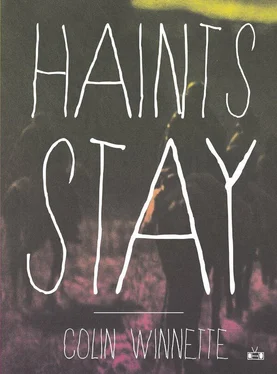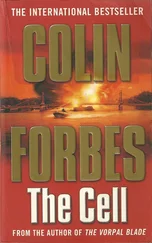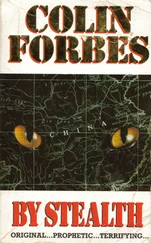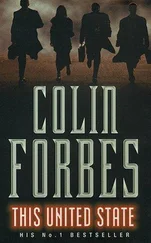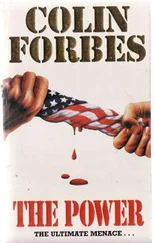He made a hard plan to stick to the ruts and see where they took him. It would make it easier for anyone following him to track him, but they would not be after him for at least half a day, if not more. It was entirely possible he had taken out every living thing in that town, other than the horses and the hogs and the chickens. He had been merciless. There was something divine to it, but he did not feel elevated. He felt more self-assured. Brooke was dead and he was alone with this child. Sugar thought that maybe if Brooke was here he would feel less conflicted about leaving the child or drowning the child and riding on. As it was, something was keeping the thing pressed to his chest. Something made him want to warm it and stop it from crying. He did not feel a tenderness toward it, but felt a strong desire to balance it out. To put the creature and himself on a more even keel.
When night fell, he did not stop riding. The baby cried as if that were its only function. It cried as a healthy man might breathe. It was a sound he found impossible to ignore. When the stars were out, Sugar slowed to a trot and tried to feed the baby. He had some cheese in his front pocket, and a bit of bread in the other, and he pressed small chunks of each to the baby’s lips, but it would not accept them. The bread gummed up there and broke apart and the baby cried and sent the little balls down its neck or onto the back of Sugar’s hand. The horse seemed tired. He was huffing and lagging. Sugar was tired. The baby was crying and, maybe, Sugar hoped, tired. They could not sleep until something in the landscape changed, until they were more hidden. Sugar remembered then where he had held the infant the moment after it was born. He opened his shirt and held the baby at his chest. The baby gummed about for a minute then took hold. It was painful, but ignorable. The minor irritation was far preferable to the crying. Sugar realized suddenly how quiet this particular wood was. The baby was working his chest and Sugar held it and rode slowly between the stubby trees. They needed to take it slow anyway because there was no moonlight and Sugar could see only a foot or so ahead of them at a time. The baby went on like that. It hurt a little more as the time passed but Sugar thought of other things and let the pain melt into his other concerns.
He did not so much care who had been after them, who had caught them, now that he had worked that town over and felt as safe as he ever could feel. He did not prefer to ponder the mystery of what had happened, but instead preferred to set himself up somewhere for a bit and try to get a few good meals in and a few good nights’ sleep. He was long overdue for a bath and a fizzy drink. These had been his simple desires what felt like only a day or two ago. It had been much longer, but the events did not come together in a way that suggested the passing of time. Rather, his memory of the past few days was scattershot and rough. There was a lot of hurry to it all. The baby gagged and spit fluid onto Sugar’s chest, then settled back into Sugar’s bent arm. Sugar did up his shirt then dug his heel into the horse’s side. They trundled along only briefly before the child burped and fell to something like sleep.
The storeroom beneath the kitchen was full of jars and sacks of food and smelled like clay. It was cool and pleasant to stand in.
“We might never have to kill a chicken,” said Mary.
Bird held a jar between his knees and pried loose the lid. He let it fall to the floor, then set the open jar on a shelf and ate the jam inside with his fingers.
“I would not mind doing it,” said Bird.
“But it would maybe be hard and chickens are tricky,” said Mary. She read the labels on the sacks one by one. “Flour, grain, oats, flour, flour, salt, flour. This little one is yeast. We can make a bread.”
“How?”
“With these things and the oven,” said Mary. “We used to make bread every week. You just mix these things.”
“How long before these things are bread.”
“Not long,” said Mary. “Once everything’s in order.”
“I’d like to eat hot bread,” said Bird.
“Do you think we are the only people left here?” said Mary.
“I hope we are the only people left here,” said Bird.
“I would be sad.”
“It’s safer that way,” said Bird.
“People aren’t bad,” said Mary.
“Bad ones are bad,” said Bird.
“Were you scared earlier?”
“You just mix these three?” said Bird.
“And water,” said Mary.
“Where’s the water?”
“I don’t know,” said Mary. “That’s why we need to find more stuff first.”
“Fine,” said Bird. “Do you think Martha will come back?”
“Yes,” said Mary. “When she’s done. She is very dependable.”
“She’s going to kill that man?”
“I don’t know.”
“I hope she does,” said Bird.
“Why?”
“Because it seems like the right thing and I would feel safer and better.”
“You have little faith in people.”
“I guess,” said Bird.
“I hate to see anyone put to death,” said Mary.
“That’s foolish,” said Bird.
“Why?”
“Because the only way to deal with an evil thing is to put an end to it.”
“I don’t like it as an idea,” said Mary. “I won’t agree to it, but I will not be called foolish.”
“Then let’s concern ourselves with bread,” said Bird.
The building had three stories: two bedrooms in the upstairs and a hallway with a ledger and a cash register. Beneath the floor level, where the restaurant was and the tables and chairs, there was the storeroom. In the rooms upstairs, they discovered warm clothes, blankets, and a basket full of buttons of various sizes. There was also thread in a drawer and several cans of oil for the lamps.
There was a long jacket hung from a peg by the door that led to the kitchen. There was nothing in its pockets. They could work the stove well enough. They could keep the fire going with wood from an enormous stack behind the building.
Every now and then, Bird would check the windows. He saw no one and nothing moving but the few remaining horses.
“What if he comes back?” said Mary.
“That’s why we have the pistol,” said Bird.
They took the pistol out behind the building. A hundred or so feet away, there was a wagon. They flipped it over and set a milk bottle on it. They walked away until they were a distance they could be proud of.
“I would like never to shoot a man,” said Mary, “but I can shoot bottles for sport.”
“How many bullets do we have?”
“She said we could find more, if we looked.”
“All we found was buttons and a coat.”
“I think she meant… around.” Mary pointed to the backs of the adjacent buildings. She swept her hand from left to right.
“She said to stay hidden.”
“I think we’re meant to sneak,” said Mary.
Bird pulled the hammer back on the pistol. The pistol was heavy enough to make him feel off balance, as if he were listing in its direction and would topple over without serious concentration when he fired. He held up the gun and exhaled. He squeezed the trigger and the gun flew from his hand. The floor of the alley coughed dirt several feet to the left of the wagon.
“You are our protection?” said Mary.
“It’s not easy,” said Bird.
Mary took the pistol and fired without much hesitation. She splintered the wagon a few inches from the base of the jar.
“We cannot shoot,” said Mary. “But I’m better.”
“We have to practice,” said Bird.
“You can practice,” said Mary, “once you’ve found more bullets.”
Mary made bread and Bird caught and killed a chicken. They kept quiet and did not explore much outside of the building with the kitchen and the bedrooms and the storeroom — and no one else, if they were around, made themselves known. There was butter in the storeroom, for the bread, and lard to cook the chicken in. They salted everything heavily. They found wine under the counter and tried it and did not like it. There was a fireplace near the base of the stairs and they made a small fire, more for entertainment than out of necessity. They did not sleep well. They made pallets on the floor near the fire with the blankets from upstairs and the clothes from the trunks. It went unsaid but understood that upstairs would not have been a comfortable place for either of them to spend the night.
Читать дальше
